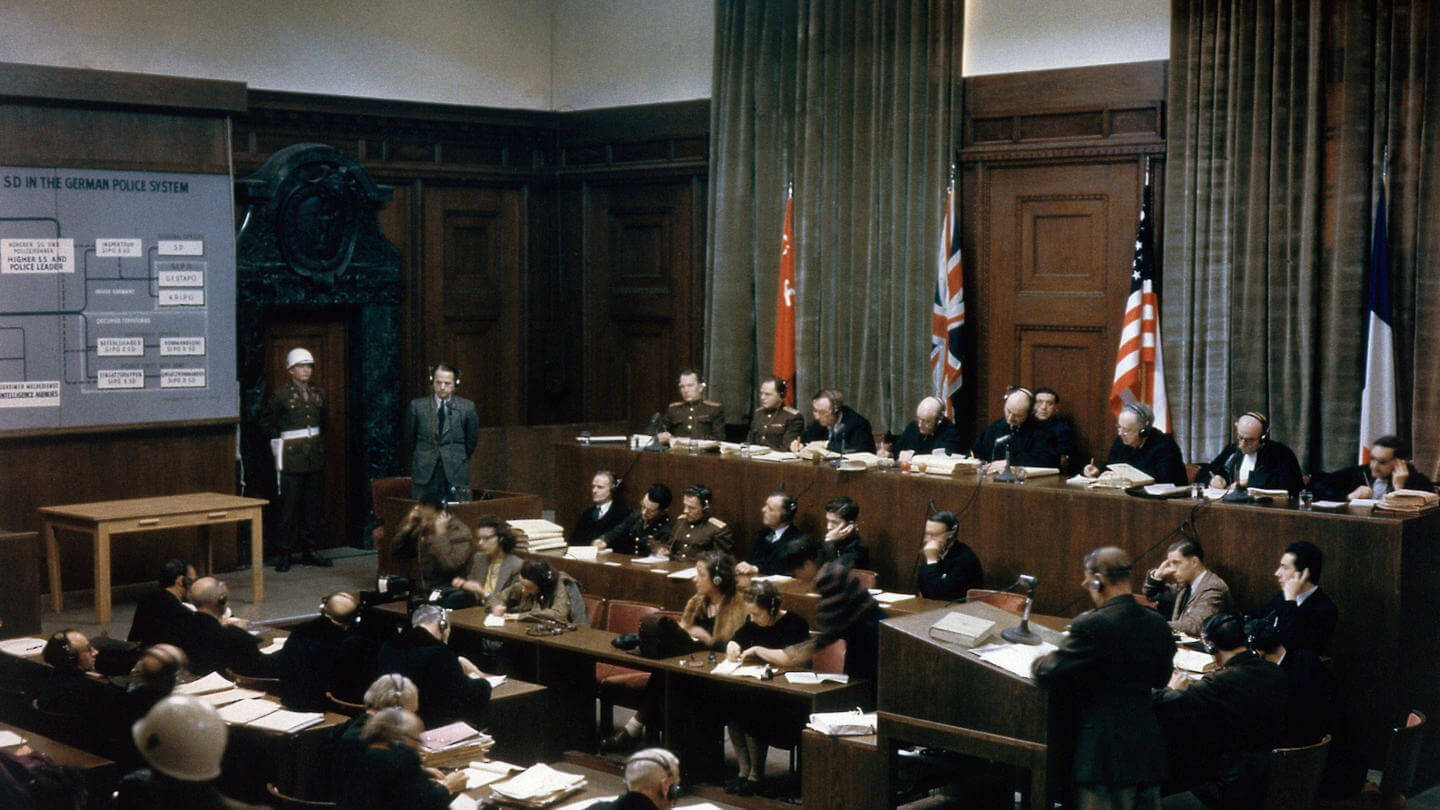On November 20, 1945, for the first time in world history, leading representatives of a state had to answer for their crimes before an international court.
Just six months after Nazi Germany’s surrender, the ‘Major War Criminals Trial’ against 24 high-ranking representatives of the Nazi Party—which included two of Hitler’s foremost generals and his second in command, Hermann Göring—opened at the Palace of Justice in Nuremberg, Germany. The proceedings, conducted by the International Military Tribunal led by representatives of the four Allied powers, lasted just under a year and ended with twelve death sentences, three life sentences, four long prison terms, and three acquittals. Charges against one of the defendants were dismissed due to incompetence to stand trial, and another had committed suicide before the hearings began. Six Nazi organizations were also indicted, including the Gestapo.
The trials broke new ground in holding government leaders responsible for their aggression and slaughter of millions of innocent civilians and established the offense of war crimes, crimes against peace, and crimes against humanity, whose legacies live on in the International Criminal Court of today. On the 75th anniversary of their commencement, here are some key things to note about the landmark trials which brought the most nefarious figures of the 20th century to justice:
Nuremberg was chosen as the location for symbolic reasons
The city of Nuremberg, which lies in the German state of Bavaria, had been the site of massive Nazi Party propaganda rallies in the 1920s and 30s and was seen by Allies as a fitting place to stage the end of the Third Reich. Additionally, the Palace of Justice and its on-site prison compound were some of the only structures left relatively undamaged by bombings during the war that had destroyed most of the city.
The Major War Criminals Trial was one of 13
Though the best-known of the Nuremberg trials was the Trial of Major War Criminals, held from November 20, 1945, to October 1, 1946, it was followed by 12 more trials. These were conducted exclusively before US military tribunals between 1946 and 1949, against 177 physicians, judges, industrialists, SS and police commanders, military personnel, civil servants, and diplomats who were responsible in implementing and advancing the Nazi agenda.
Among those prosecuted were the Nazi death squad and the leaders of the company that made Zylon B, the chemical used in gas chambers. The 12 hearings are collectively known as ‘The Subsequent Nuremberg Trials,’ and of the 177 defendants, 24 were sentenced to death (of which 13 were executed), 20 to lifelong imprisonment, 98 to long prison terms, and 25 were found not guilty.
Hermann Göring committed suicide one day before his scheduled execution
Gestapo founder and Luftwaffe (German air force) commander-in-chief Hermann Göring took his own life on October 15, 1946, by ingesting potassium cyanide, just a few hours before his execution. He was the highest-ranking Nazi to survive the war. Hitler and two of his top associates, Heinrich Himmler and Joseph Goebbels, had each committed suicide in the spring of 1945 before they could be brought to trial.
The Nuremberg Trials were of many firsts
The Nuremberg Trials marked the establishment of international criminal law, given that all previous prosecutions of war crimes had been conducted according to the laws of a single country. However, when it came to trying top Nazi leaders, it was done by a panel of four judges, each representing an Allied power (US, UK, France, and the USSR). This paved the way for the subsequent prosecution of war crimes in Japan, and led to the adoption of the UN’s Genocide Convention and the Universal Declaration of Human Rights in 1948, along with the Geneva Convention on the Laws and Customs of War in 1949. Nuremberg was the reason the rest of the world heard about the scale of murder and enslavement committed during the Holocaust, which was until then largely unknown.
The trials also witnessed the first-ever prosecutions for crimes against humanity and genocide. The proceedings were also the first to use instant translation since the accused men and the judges spoke four different languages.
The Nuremberg Trials: 75 Years On
On their 75th anniversary, here are some key things to note about the landmark trials that brought some of the most nefarious figures of the 20th century to justice.
November 21, 2020

SOURCE: HISTORY.COM
